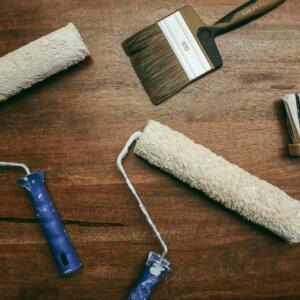
When you’re ready to make your dream come true of buying your first home, it’s time to start serious money saving for your mortgage deposit. The more that you have saved for your house deposit, the more mortgage options you’ll have to choose from as a first-time buyer, plus you could get lower interest rates and lower monthly repayments – and who doesn’t want to pay less for their mortgage?
If you want to buy a home that’s worth £250,000, for example, mortgage lenders will require you to have £12,500 for a 5% deposit mortgage, and £25,000 for a 10% deposit mortgage. Whether you’re saving for a house alone, as a couple, or with a friend, any help you can get will be so valuable as you watch your savings mount up and the day you collect the keys to your first home starts to feel even closer.
How to save for a house deposit
To help make saving for your deposit easier, and perhaps more enjoyable, we’ve put together 20 must-read tips and tricks for every hopeful first-time buyer.

1. Get on top of your spending
Unfortunately, there is no magic method of how to save for a house deposit (unless you’re lucky to be receiving a gifted deposit), and ultimately getting in control of your everyday spending will enable you to save more, and save regularly. Every month or so, take the time to review your spending habits, from your regular treats to those impulse purchases, and identify where you could make cutbacks in the next month to free up more money to save.
Not buying a coffee every morning, and making your own avocado on toast isn’t going to make your savings balance skyrocket, but having an awareness of your outgoings and where you’re being tempted into spending money that you’d prefer to save, is a healthy habit to practise.
2. Round up the change
If you use online banking, you may have the option to automatically round up the total to the nearest pound every time you spend, and save the difference into a specified savings pot or account.
This is a really easy way to build your savings without even realising you’re doing it – you just make your purchases as normal, and the saving is done for you.
3. Take the 52-week saving challenge
Making a game out of saving for a deposit can help you to stay on track. After taking the 52-week saving challenge you’ll have saved almost £1,400, a healthy amount to put towards your mortgage deposit.
In the first week of the challenge, you’ll save £1, followed by £2 in week two, £3 in week three, and so on until you save £52 in the final week – and you’ll have £1,378 to show for your efforts. You can also take the challenge in reverse, starting with the £52 and decreasing the amount each week, which might be helpful if you’re starting the challenge at the beginning of the year and don’t want to make bigger savings commitments around Christmas time.
4. Open a high-interest savings account
Make your savings work harder for you by placing them into a savings account with as high an interest rate as possible.
The types of accounts available changes all the time, and rates fluctuate, so if you’ve had the same savings account for a while it could be worth looking around to see if there is a better rate available for an account that suits your savings goals and habits.
5. Open a Lifetime ISA (LISA)
For savers who are over 18 and under 40, a Lifetime ISA (Individual Savings Account) can help you save for your first home, with a government bonus of 25% on top of your annual savings. Also referred to as a LISA, a Lifetime ISA has an annual deposit limit of £4,000, which means you could receive an extra £1,000 per year to put towards your house deposit.
LISAs are designed specifically to help first-time buyers to purchase a home with a mortgage, or to boost savings for later life, so you’ll have to give back the bonus if you withdraw money for any other reason. For more information, take a look at the Government’s guide to Lifetime ISAs.

6. Review your bills and make smart switches
If you haven’t changed your internet provider or insurance company in a few years, it’s time to start shopping around to see if you can get a better deal on your utilities – and free up some extra cash for your savings fund.
There’s a bit of legwork required to switch your suppliers, but online comparison sites can help you to find better deals more quickly, so you aren’t wasting money that would be better off going towards your mortgage deposit.
7. Earn cashback on your regular spending
Who wouldn’t like to earn money just by doing their usual shopping? Use cashback websites or cashback credit cards when making purchases with eligible major retailers, and you could be rewarded with a percentage of the total spend, either as cash in your bank account – which you could add to your house deposit savings - or as vouchers to use towards future purchases.
This is another way of building your savings with fairly little effort, as you’re earning money by doing your regular shopping and spending.
8. Take advantage of loyalty schemes and discounts
For any stores or brands that you regularly shop with, make sure you’re signed up to their loyalty schemes which could earn you rewards, or even discounts, each time you visit. Add their apps to your smartphone so you always have your account details at hand.
While this may not always put cash directly into your pocket, in the long run it could earn you money off your shopping - which means you have more money available to save.
9. Complete paid surveys in your spare time
If you’re someone who likes to let others know what you think, get rewarded for it by completing paid surveys. There are many websites on which you can sign up to participate in opinion surveys, some of which can be as easy as filling out a short form on your smartphone, and you could receive cash or voucher rewards in return for your time.
This is a great way to make a little extra money to help you reach your deposit savings goal, all while you relax in front of the TV, complete your public transport commute, or enjoy your lunch break.
10. Change your renting situation
While this isn’t going to be possible for everyone, reviewing your current renting situation and moving to a more affordable location or property could make a significant difference in reaching your savings deposit goal.
Whether you have the option to move in with a friend, relocate to a cheaper area, or even live with family again, you could save hundreds of pounds each month and accelerate your saving journey so you get onto the property ladder more quickly.
However, mortgage providers are increasingly recognising the struggle that renters face when saving for a deposit, and innovative products such as the Track Record deposit-free 100% mortgage are coming onto the market. The Track Record mortgage enables eligible renters who don’t have a deposit, to purchase a home by providing evidence that they have made consistent rental payments for at least 12 months.

11. Clear out your wardrobe
Whether your wardrobe is bursting at the seams, or your home is cluttered with belongings you no longer want or need, selling your unwanted items can generate money for you to save – with the added bonus of reducing the amount of stuff you’ll need to pack when it’s finally time to move into your first home.
From car boot sales and local online marketplaces, to apps that enable you to sell to people nationwide, it’s never been easier to clear out your home and make some money back that you can put towards your mortgage deposit.
12. Consider how you travel
Travelling more mindfully is good for the environment, and it could be good for your finances too. Considering whether there may be a better option for your regular commute or longer trips could help to reduce your monthly outgoings, which – you guessed it – means you may have more money available to save.
So if you typically drive to work every day and pay for parking, explore local public transport options and find out if there’s a route that would get you there on time, whilst saving you money, or start ride-sharing with a colleague. If you’re already a public transport user, take advantage of any available discounts on weekly or monthly passes, and find out if your company offers subsidies. Or if you’re fortunate enough to live close to work, walking or cycling in – even just occasionally – can make a difference in cutting back your spending.
13. Automate your savings
Treat saving like another regular outgoing, and you’ll find it much easier to build your deposit gradually and consistently. Automate your savings so that a set amount is deposited into a separate account as soon as you get paid, and you won’t be tempted to spend the money.
You can also try a budgeting app to help you to manage your spending commitments, and allocate your money for the things you want and need, so you aren’t tempted to overspend throughout the month.
14. Find a secondary income
If you have a few hours a week (and the energy) to spare, finding a second source of income on top of your primary job can help to ramp up your savings efforts. From baking birthday cakes for family and friends, to freelancing, food delivering, cleaning, or tutoring, you can make the most of your individual skills and interests while bringing in extra cash to save towards your mortgage deposit.
Just be aware of the HMRC rules around additional income as well as checking your employment contract for any restrictions on taking on secondary employment.
15. Pay bills in full where possible
Paying larger bills, such as your car insurance, by monthly Direct Debit is more convenient, but it may come at a cost.
Some providers may add on a premium for payments made by Direct Debit, so it’s always worth checking to find out whether it’s cheaper overall to make payments in one lump sum, wherever you can. And once your bills are lower, you’ve more money in the pot to save.

16. Try ‘no spend weekends’
From spontaneous brunches to shopping splurges, and Sunday afternoon drinks in your local beer garden, the temptation to spend money comes from all angles at the weekend. Committing to regular ‘no spend weekends’ – during which you spend no money other than on the absolute bare essentials – can bring your outgoings under control and give you a big push towards your house deposit savings goal.
Your ‘no spend weekend’ doesn’t have to mean staying in the house, though (unless that’s what you would like to do of course); you can make your own coffee before going out for a walk, take a homemade picnic to the park or beach, or raid your drinks cabinet to make cocktails to sip in the garden.
17. Change your food shopping and cooking habits
Grocery shopping is an unavoidable expense, but you can keep the costs down by changing the way you shop, and getting into smart habits when planning your food shopping and cooking.
Switching to a cheaper supermarket is a good start, as is making a shopping list before you head out, to avoid impulse purchases and spending more than your planned budget. There are also lots of benefits to weekly meal planning, including reducing your household food waste, making your money go further, and streamlining your day by removing the stress of deciding what to make for dinner.
18. Get paid to switch banks
Loyalty doesn’t always pay, so if you aren’t enamoured with your current banking provider, it could be time to switch – and you could be rewarded for doing so.
Many banks and building societies offer cash rewards for switching to them, which you could add to your savings for a little boost.
19. Earn cash or rewards for recycling
From beauty products to printer cartridges, and mobile phones to used clothing, there are a surprising number of schemes for hard-to-recycle items that can actually pay you in cash or rewards for using their services.
Many major retailers are offering recycling programmes that require you to bring your unwanted products into a store for a voucher off your shopping, whereas other schemes may pay cash for good-quality items, such as big bundles of clothing that can be resold, or an old smartphone that can be refurbished. As with many money-saving tips, using these schemes won’t necessarily earn you a lot of money, but are another small step you can make towards a big goal.
20. Use a ‘cooling off’ period before making an expensive purchase
If you’re prone to making impulse purchases, try a ‘cooling off’ period before buying, to see if it helps to slow down your unplanned spending. Whether an item is in your online basket or you’ve spotted it when out shopping, wait 48 hours before you head to the checkout, and you might find that the urge to buy it is no longer there.
This also gives you time to shop around and see whether you can find a discount on the item you want, or if you can find a better deal on a similar item. And if you decide you didn’t want it after all? Great, that’s more money you can save for something that you do really want: your first home.
Find out how new build Bellway homes are helping to unlock home ownership for first-time buyers, and read about the fantastic buying schemes that are available to help you boost your deposit, or make your first home more affordable. And when you’re ready to take your first step onto the property ladder, read about how an independent mortgage advisor could help you to find the best deal to suit your individual circumstances.
Share
Topics
Money Saving Tips First-Time BuyerYou might also like
-

100% Mortgages – Your guide to zero deposit mortgages
-

First time buyer myths busted: Why you can buy your first home in 2025
-

Deposit Unlock: All you need to know about the new scheme to help first-time buyers
-

The things you need when moving into your first home
-

How do gifted house deposits work when applying for a mortgage?




